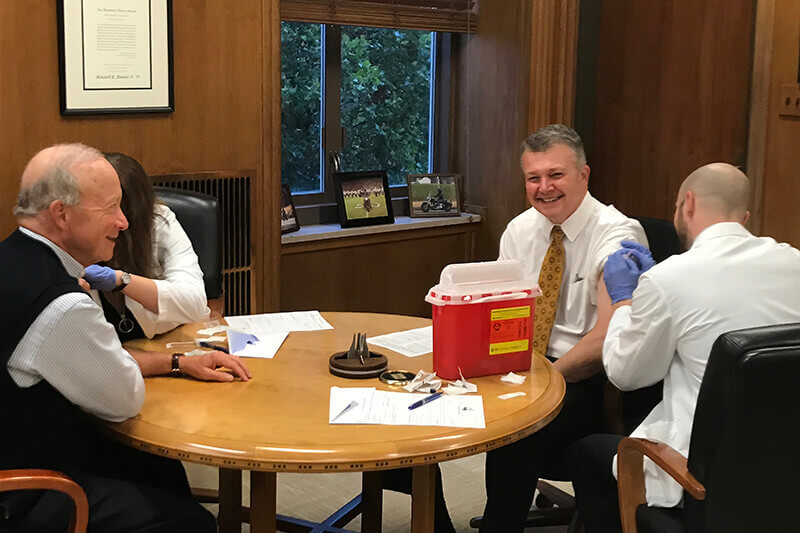October 30, 2019
There’s still time to get a flu shot
 Purdue University President Mitch Daniels, (far left) and Jay Akridge, provost and executive vice president for academic affairs and diversity (facing), receive their flu shots. (Purdue University photo)
Purdue University President Mitch Daniels, (far left) and Jay Akridge, provost and executive vice president for academic affairs and diversity (facing), receive their flu shots. (Purdue University photo)
WEST LAFAYETTE, Ind. — While most health care providers recommend Americans get a flu shot by the end of October, people that haven’t had the chance to get a vaccine yet still have time.
The Centers for Disease Control and Prevention reports that there is currently only sporadic flu activity around the nation and levels are expected to increase in the coming weeks.
Libby Richards, an associate professor of nursing who specializes in public health at Purdue University’s School of Nursing, says people can still get flu vaccines throughout the season, but need to keep in mind that the vaccine takes two weeks for protective antibodies to develop.
General guidelines from the CDC call for everyone 6 months of age and older to get the flu vaccine. Certain populations – including pregnant women, young children, older adults and people with chronic health conditions, especially COPD or asthma – need to get vaccinated.
 Libby Richards, associate professor of nursing at Purdue University. (Purdue University photo)
Download image
Libby Richards, associate professor of nursing at Purdue University. (Purdue University photo)
Download image
“The flu is more likely to cause severe illness and complications in young children, pregnant women and older adults,” Richards says. “It’s important that those around people in those high-risk groups get a flu vaccine as well. Complications from getting the flu can range from sinus and ear infections to pneumonia, sepsis or, in some cases, death.”
However, there are people who cannot get the flu vaccine – such as infants under 6 months of age or those with a history of Guillain-Barre syndrome.
“For newborns and infants, the best protection strategy is to encourage everyone who is around the infant to get the flu vaccine,” Richards says. “It’s alright to tell friends, aunts, uncles and grandparents that they can’t visit if they aren’t vaccinated.”
For others, practicing good health habits and preventative measures are the best defense. “Wash your hands often, cover your mouth when you cough, properly dispose of tissues, avoid close contact with others and don’t touch your eyes, nose and mouth to limit germs,” Richards says.
Writer: Matthew Oates, 765-496-2571, oatesw@purdue.edu, @mo_oates
Source: Libby Richards, 765-494-1392, erichards@purdue.edu, @LibbyAnnR1

